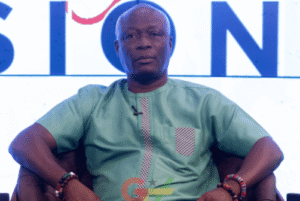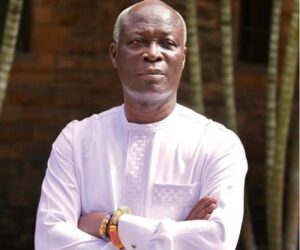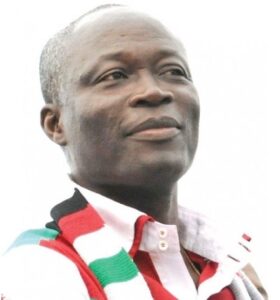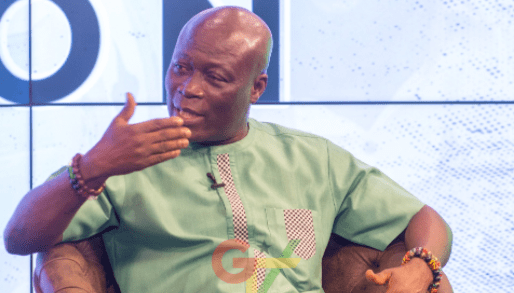Former Odododiodio Member of Parliament and current National Coordinator of the District Road Improvement Programme (DRIP), Nii Lantey Vanderpuye, has publicly declared his readiness to contest for the position of National Chairman of the governing National Democratic Congress (NDC), on the condition that the incumbent Chairman, Johnson Asiedu Nketia, decides not to seek re-election.
Speaking during an interview on “Face to Face” broadcast by Citi TV on 21 October 2025, Vanderpuye stated, “If the current Chairman, my very good brother Johnson Asiedu Nketia, is not contesting, I will contest.”
His remarks align with ongoing speculation that Asiedu Nketia, who has served as National Chairman since 2022 and before that as General Secretary for nearly two decades, is considering a run in the 2028 presidential primaries.

Vanderpuye’s entry, albeit conditional, into the race signals possible shifts within the NDC’s internal leadership dynamics. A well-known figure in party and parliamentary circles, his potential candidacy has already ignited conversations in NDC ranks about future leadership succession should Asiedu Nketia step aside.
Analysts say that Vanderpuye’s timing could be strategic. With internal sentiment among younger delegates favouring generational renewal, a scenario where Asiedu Nketia steps aside or pursues a presidential bid might make space for challenger voices. Vanderpuye’s background, as a former MP and senior government official, positions him as a representative of both experience and mobilisable grassroots support.
Critics, however, raise questions about the wisdom of making a candidacy contingent on another leader’s decision. “One always wants clarity. If he’s interested in the chairmanship, he ought to articulate his vision regardless of what the Chairman does,” said a senior NDC regional organiser who asked to remain anonymous. They noted that building a campaign contingent on another’s withdrawal may undermine perceived independence.

In response, Vanderpuye emphasised his respect for Asiedu Nketia’s leadership and described the current phase as one of transition rather than confrontation: “I have great respect for Chairman Asiedu Nketia. If he decides to continue, I will not contest. But if he bows out, I am ready to step in and serve the party.”
His tone suggested an intent to keep internal unity while signalling readiness for a new chapter.
The broader implications for the NDC are significant. The party remains a dominant force in Ghanaian politics but faces pressures around internal democracy, delegate representation and the long tenure of senior leaders. A new leadership structure could be seen by some as necessary for rejuvenating the party’s image ahead of 2028. In that light, Vanderpuye’s statement may reflect both ambition and a recognition of shifting party dynamics.
If the race materialises, major issues likely to shape the contest include: how to handle the balance between experienced party hands and emerging leaders; how to enhance grassroots engagement and delegate participation; and how to reassure party members that leadership change will not result in internal fragmentation. Vanderpuye may capitalise on his work with DRIP and his public-service credentials to argue for effective programme delivery and organisational reform.

For the current Chairman, the question is whether he will stand again or move into a different role within the party. Asiedu Nketia has not yet issued a formal statement on his 2028 ambitions, and internal observers suggest the next few weeks will determine whether the party shifts towards a standalone leadership race. One regional delegate observed: “If Asiedu Nketia signals intent to stay, it could deter potential rivals. But this statement by Vanderpuye accelerates the timeline for clarity.”
For party faithful and outside observers, the evolving narrative brings both opportunity and risk. Opportunity because the NDC may usher in renewal and broader participation; risk because leadership transitions in major parties can provoke fractures if not well managed. Holding the competitive edge while maintaining unity will be critical.
Should Vanderpuye move beyond this conditional readiness to a formal campaign, he will likely need to articulate a clear manifesto addressing internal party reforms—such as decentralised structures, stronger accountability to delegates, and preparations for national strategy. Importantly, he will need to engage both the party base and younger activists who often call for change and new leadership style.
The road ahead is open. With the claim made public, all eyes are now on Asiedu Nketia’s next step, the readiness of other potential contenders, and how party elders respond. Whether the NDC chairmanship race becomes activated or remains pending the incumbent’s decision, Vanderpuye’s move adds momentum to what might be a significant leadership milestone for the party.
“Those Who Disagree With My ‘Thank You Tour’, Continue With Your Disagreement” – Asiedu Nketiah

